

Patriachal society; Women rulers. ; Fight for womens rights. ; 19th Century accomplishments. ; 20th Century accomplisments; Women in 21st Century
In the 21st century women are finally achieving equality with men in recognition of their talents.
Since the beginning of modern humans, males have dominated societies,
major religions have all been male dominated and misogynistic.
Regardless, there have been many women who gained great influence and contributed greatly to history.
This is their story.
There is considerable evidence that in ancient times there were matriarchal societies in which the women were dominant and worshipped female godesses. Findings at CatalHoyuk in Anatolia (Turkey), and at sites in southern Ukraina and in Moldavia dated in the period 7000 to 4000 BCE, all indicate that possibility. At the very least, in primitive societies there was gender equality. The Polish anthropologist Bronisław Malinowski found matrifocal societies on the western Pacific islands at the beginning of the 20th century. Remnants of such societies still existing today are the small Mosuo tribe in the Yunnan province of south-west China, the Aka people in Africa's Congo Basin and the people of the hilly Indian state of Meghalaya. Among the native Americans such traditions existed, particularly the Cherokee and Hopi tribes.
However, when humans started settling and establishing ownership of property, male dominance took the upper hand. Already in Babylon patriachal tendencies had taken over and women were reduced to a domestic role subservient to men, however their rights to property and inheritance were safeguarded and spelled out in detail in the Code of Hammurabi, the earliest known legal code (1772 BCE).
In ancient Greece, the Athenian philosopher Aristotle portrayed women as morally, intellectually, and physically inferior to men; saw women as the property of men; claimed that women's role in society was to reproduce and serve men in the household; and saw male domination of women as natural and virtuous.
The Greek historian Herodotus expressed his astonishment that in Egypt women could inherit, purchase and own property and slaves, and could make legal contracts, all things they could not do in ancient Greece. Herodotus records that there even was a female pharaoh, Hatshepsut, who ruled for 20 years in the 15th century BCE, and was responsible for some of Egypt's monumental architecture at Karnak.,
However, the Greek female writer Sappho (6th century BCE) was recognized by Plato as one of ten great poets of that period.
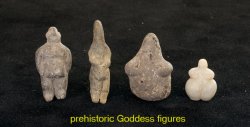 Early pagan religions worshipped both gods and godesses, but when Moses had his visions and developed the tenets of the first monotheistic religion (probably 15th century BCE), he portrayed Yahweh, the one God, as a father figure. Thus Jewish society became intensely patriarchal in form, to the extent that women were eventually required to pray separated from men.
Early pagan religions worshipped both gods and godesses, but when Moses had his visions and developed the tenets of the first monotheistic religion (probably 15th century BCE), he portrayed Yahweh, the one God, as a father figure. Thus Jewish society became intensely patriarchal in form, to the extent that women were eventually required to pray separated from men.
Jesus preached the equality of men and women, but within a couple of centuries the leaders of the Christian community reverted to a purely patriarchal tradition, while, at the same time venerating the Virgin Mary and various women martyred in the first three centuries while propagating the Christian faith in hostile Rome.
In the Middle Ages any women who became too uppity were branded by church leaders either as whores or witches. Joan of Arc was accused of witchcraft and burned at the stake for daring to influence the French king and become a leader of an army to fight the British invaders.
There were a few exceptions, for example Elena Cornaro Piscopia, (1646-1684), a Venetial noblewoman. was the first woman ever to receive a PhD in philosophy, in 1678, from the University of Padua.
Marie Crous (date of birth unknown) was a French mathematician. She introduced the decimal system to France in the 17th century and was frequently quoted in later mathematical works.
Through marriage or motherhood, or as their father's heir when there were no sons, royal women occasionally rose above their culturally-restricted roles. But it required supreme talent and effort and ruthlessness to command male dominated kingdoms.
Empress Theodora (500-548 CE) was one of the most influential and powerful women in the Early Middle Ages. She was the wife of Emperor Justinian I and joint ruler of the Byzantine Empire.
Theodora participated in making Constantinople one of the world’s most sophisticated cities and promoting women’s rights. She had bridges, aqueducts, and churches built. One such building, the Hagia Sophia, built between 532 AD and 537, is considered one of the greatest examples of Byzantine architecture. She had laws passed that prohibited forced prostitution and closed brothels. Theodora also gave women more rights in divorce and property ownership. She gave mothers guardianship of their children, instilled a death penalty for rape, and forbade the killing of wives who committed adultery.
Wu Zetian, rose from concubine to become Empress of China in 690 CE. She ruled for 15 years and replaced Confucian beliefs with Buddhism as the state religion of China.
Eleanor of Aquitaine (12th century) is renowned in the history books; she became Duchess of Aquitaine in her own right while she was still a child, then later queen consort of France (1137–1152) and then England (1154–1189). She participated in the Second Crusade, reaching Allepo (present day Syria) together with her husband Louis VII. She is also credited with promoting troubadours singing tales of courtly love and chivalry of knights towards women at her court at Poitiers.
Elizabeth I (1533 – 1603) was queen regnant of England for 45 years. She imprisoned her half-sister Mary of Scotland and finally executed her - to remove a threat to her rule. She founded the Church of England as it exists today. She is famous for the buildup of the British navy which ultimately defeated the Spanish armada threatening an invasion of England. However, her reign is also remembered for the flourishing of English drama, led by playwrights such as William Shakespeare and Christopher Marlowe.
Maria Theresa succeeded her father as empress of the Hapsburg controlled lands of Central Europe in 1740 and ruled until 1780. She brought about many economic and political changes to her empire. She centralized the government of the many component principalities. She strongly promoted education and liberal politics. Some of Maria Theresa’s civil reforms included the abolition of witch-burning and torture, restricting capital punishment, and making education mandatory.
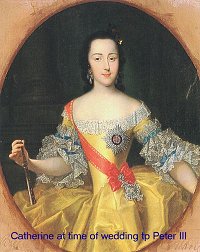 Catherine the Great, the daughter of a minor German prince, organized a coup by the imperial guard and murder of her husband, Tsar Peter III, to become Empress of Russia in 1762 and ruled until 1796. Renowned for her numerous affairs and her ruthlessness towards political opponents, nevertheless she is regarded as one of Russia's greatest rulers. She modernized the army and government and expanded the rule of Russia from the Baltic to the Black Sea and over the Pacific ocean to Alaska. She commissioned art, literature and building in the western style. She had many modern (for the time) ideas, even corresponding with the French philosopher Voltaire. She established one of the first schools for women, the Smolny Institute.
Catherine the Great, the daughter of a minor German prince, organized a coup by the imperial guard and murder of her husband, Tsar Peter III, to become Empress of Russia in 1762 and ruled until 1796. Renowned for her numerous affairs and her ruthlessness towards political opponents, nevertheless she is regarded as one of Russia's greatest rulers. She modernized the army and government and expanded the rule of Russia from the Baltic to the Black Sea and over the Pacific ocean to Alaska. She commissioned art, literature and building in the western style. She had many modern (for the time) ideas, even corresponding with the French philosopher Voltaire. She established one of the first schools for women, the Smolny Institute.
Queen Victoria 1837-1901. The Victorian Era influenced conservative religious and social attitudes, fashion, and politics in her country as well as in the United States and other nations. Victoria contributed to massive political and social reforms in the United Kingdom as well as in the British Empire. Under her reign the British empire expanded throughout Africa and Asia.
One of her first accomplishments was supporting a bill in Parliament which abolished slavery in 1838, throughout all colonies in the British Empire. In 1847, she supported the Factory Act which reduced the working day in textile mills to ten hours.
She influenced members of Parliament who passed the Married Women's Property Act in 1870. This act allowed the wages and earning made by a wife to be held by her for her own separate use; a wife was allowed to keep any property she inherited as her own; also
to hold rented property in her own name.
In the 18th. century CE, Enlightenment, otherwise known as the Age of Reason, spread throughout Europe from France, with the aim of reforming society, using reason. It opposed superstition, absolute rule of monarchs and the dogmatism of the church. Prominent philosophers and writers of the movement were Rousseau, Voltaire, Spinoza.
Although promoting equality of man, women was mostly ignored. , women played a role in the movement, organising salons in which intellectuals gathered for discussion.
Mary Wollstonecraft (1759-1797) was the only woman who achieved prominence in the movement, a true pioneer in the struggle for female suffrage. She wrote a book “A Vindication of the Rights of Women”. Unfortunately she died at age 38 in childbirth.
This period ended with the French Revolution in which women achieved equality only in the right to be imprisoned and guillotined, whenever accused of disagreeing with the leaders.
In the 19th. century, many more women gained prominent roles either as reformers, or as artists and scientists; and gained grudging and often resentful acceptance by male-dominated organizations.
Among the great women fighters for reform are:
Susan B. Anthony 1820-1906 - who campaigned against slavery and for the promotion of women’s and worker's rights in the United States. She began campaigning within the temperance movement and this convinced her of the necessity for women to have the vote. She toured the U.S. giving countless speeches on the subject of human rights.
Millicent Garrett Fawcett, (1846 - 1929), was a leading suffragist and campaigner for equal rights for women in Great Britain and played a key role in gaining the vote for women. She also helped found Newnham College, Cambridge.
Emmeline Pankhurst, (1858-1928) - British fighter for the right to vote was jailed many times.
Emily Howard Stowe (1831–1903) – Canadian physician, advocate for women's inclusion in the medical professional community and founder of the Canadian Women's Suffrage Association.
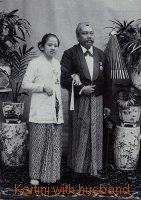 Raden Ajeng Kartini(1879-1904), Javanese (Indonesia) activist for the education and emancipation of women and abolishing the Muslim practise of polygamy. Born to a prominent Javanese family, she was secluded in the Muslim fashion. But she educated herself and conducted a letter writing campaign to promote her beliefs. In an arranged marriage she became the fourth wife of the Regency chief of the Rembang province. Her husband allowed her to establish a school for women. At the age of 25 she died from childbirth complications but a foundation was established in her name which built schools for women throughout Java. 21 April is now Kartini Day, a national holiday in Indonesia.
Raden Ajeng Kartini(1879-1904), Javanese (Indonesia) activist for the education and emancipation of women and abolishing the Muslim practise of polygamy. Born to a prominent Javanese family, she was secluded in the Muslim fashion. But she educated herself and conducted a letter writing campaign to promote her beliefs. In an arranged marriage she became the fourth wife of the Regency chief of the Rembang province. Her husband allowed her to establish a school for women. At the age of 25 she died from childbirth complications but a foundation was established in her name which built schools for women throughout Java. 21 April is now Kartini Day, a national holiday in Indonesia.
Unfortunately, in spite of all the efforts of the suffragettes, and the time they spent in jail, the male political establishment did not allow anything to happen until the next century.
Although the fight for voting rights made little progress in the 19th. century, little by little women gained iimproved property rights, the right to education, first in elementary and secondary schools. By the end of the century most universities in Europe and the Americas were admitting women.
During the 18th. and 19th. centuries, the role of women in economic life had also changed. Previously their employment outside their own home had been limited to that of nannies, governesses, maidservants, on the farm, and in the making of textiles and sewing of clothing (in particular for women and children). In many eastern countries women had traditionally worked on looms for the making of carpets as well as textiles.
Industrialization had broadened their opportunities, particularly in the rapidly expanding textile mills. But at the same time their working conditions had worsened, being forced to work for long hours in dangerous conditions.
Strong-willed women made progress in the fields of science and medicine. Among the most prominent:
Ada Byron Lovelace, (1815-1852) - the first ever computer programs were written by the daughter of the poet Lord Byron, for use in the Babbage computing engine.
Marie Sklodowska-Curie, 1867-1935 - discoverer of radio-activity, winner of two Nobel prizes. First woman to be appointed full professor at Sorbonne (University of Paris) in 1906.
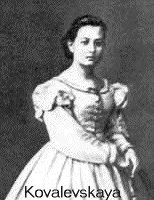 Sofia Kovalevskaya, (1850-1891), born to a Russian minor nobility, not permitted to study in Russia, in 1869 she travelled to Germany. There she was admitted on exceptional basis to University of Heidelberg to study mathematics. In 1874 received PhD summa cum laude from University of Göttingen (Germany). First woman to be appointed full professor, 1889 at University of Stockholm. She received awards for her papers on differential equations and the mathematics governing Saturn's rings.
Sofia Kovalevskaya, (1850-1891), born to a Russian minor nobility, not permitted to study in Russia, in 1869 she travelled to Germany. There she was admitted on exceptional basis to University of Heidelberg to study mathematics. In 1874 received PhD summa cum laude from University of Göttingen (Germany). First woman to be appointed full professor, 1889 at University of Stockholm. She received awards for her papers on differential equations and the mathematics governing Saturn's rings.
Caroline Herschel, (1750 – 1848), born in Hanover (Germany) she accompanied her musician brother Wilhelm to England. When he started building telescopes and studying stars, she assisted him and soon became an astronomer in her own right. In 1786 she discovered a comet, named after her. Later she discovered several more comets and catalogued the stars. In 1828, she received the Gold Medal of the Royal Astronomical Society, the only woman to do so for another 168 years.
Elizabeth Blackwell. (1821-1910), was the first woman to receive a medical degree in the United States, in 1849 at Geneva Medical College (now part of N.Y. Upstate Medical University). She was also a pioneer in promoting the education of women in medicine. In 1857, together with her sister Emily, who had also obtained a medical degree, and Dr. Marie Zakrzewska, she expanded her original dispensary into the New York Infirmary for Indigent Women and Children.
Florence Nightingale, (1820-1910), enrolled as a nursing student at the Lutheran Hospital of Pastor Fliedner in Kaiserwerth, Germany. She then accompanied the Briish Army to Crimea (1853) where she set up field hospitals with emphasis on hygiene, reducing the mortalty rate by 60%. Upon return to England, she received a large award from the British Government. She decided to use the money to fund the establishment of St. Thomas' Hospital in London, and within it, the Nightingale Training School for Nurses.
In the arts several women writers achieved success, although in the early 19th century, several them used male names, in order to be published at all, or to be treated seriously. Among them:
The Bronte sisters, Charlotte, Emily, and Anne, (1818-1858) did not reveal themselves as the original authors, until several of their novels - Jane Eyre, Wuthering Heights, and others, gained popularity in Great Britain and North America.
George Eliot, (1819-1880), (Mary Ann Evans) British novelist used a male pen name to ensure her works were taken seriously is best known for Middlemarch and Mill on the Floss.
In France, George Sand. (Aurore Dupin; 1804-1876) first became an essayist for the Paris newspaper Figaro, then wrote several novels. She was an ardent socialist.
Other prominent and influential women writers of the 19th. century included:
Jane Austen, (1775 – 1817), first widely acknowledged British woman novelist. Her books, including Pride and Prejudice, Sense and Sensibility, realistically highlight the dependence of women on marriage to secure social standing and economic security.
Harriet Beecher Stowe, (1811-1896), is best known
for her antislavery novel, Uncle Tom’s Cabin which profoundly effected the thinking of people in the northern states, prior to the Civil War.. She also wrote nine other novels and essays.
Hannah Adams, (1755-1831) the first professional woman writer in the United States wrote history books.
The efforts of women to assist their compatriots in two World Wars, working in industry and fulfilling important roles in the armed forces of their countries, played a major part in achieving recognition of their capabilities, physical and intellectual. Consequently, by the end of the century, laws guaranteeing their equality with men had been passed in most major countries.
By the end of the century women had been elected in large numbers to the legislative bodies, were participating in governmental bodies, and were occupying major executive positions in major corporations. True, their numbers in important positions were still much less proportionally than the number of women in the lower ranks of these same organizations and much lower than the approx. 50% of females in the overall population.
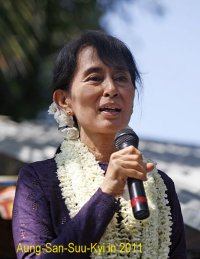 Although no woman has served as President of the United States, 17 women served as elected governors of various states in the 20th century.
Although no woman has served as President of the United States, 17 women served as elected governors of various states in the 20th century.
Running for major public office can be dangerous, particularly for a woman.
Benazir_Bhutto , was twice elected Prime Minister of Pakistan (1988 and 1993). She was the first woman to be elected to any major office in a Muslim country. In 2007 she was running for a third time and was assassinated two weeks before the election.
Aung-San-Suu-Kyi
spent 15 years in house arrest because of her opposition to the military government of Myanmar (Burma). She was less severely treated because she is the daughter of a national hero, who was assassinated in 1947 during the fight for independence. Awarded Nobel Peace Prize in 1991. in 2008 she was awarded the U.S. Congressional Gold Medal, while she was still imprisoned. After relaxation of military government in 2011, and her release, her party won 81% of seats in parliament.
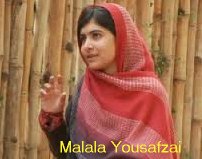 Often women still earn less than men in equivalent positions, but in most countries women have achieved equal rights.
Often women still earn less than men in equivalent positions, but in most countries women have achieved equal rights.
Until a few years ago women were notably absent from positions of C.E.O. or C.F.O. in major corprations. Now the July 2013 issue of Fortune magazine lists 21 women as chief executives of the largest corporations, including DuPont, General Dynamics, Hewlett-Packard, IBM, Lockheed-Martin, Pepsico, Xerox.
Women have become anchor-persons on many prominent television and radio news programs.
Even in predominently Muslim countries, the situation is slowly improving. Since the year 2000, women have been elected to prominent positions in several such countries - president in Indonesia, two consecutive prime-ministers in Bangladesh, president in Kyrgyzstan, prime-minister in Senegal.
Women have been elected to parliament in the predominantly Muslim Afghanistan, Algeria, Bahrain, Bangladesh, Bosnia, Iran, Iraq, Kuwait, Pakistan, Saudi Arabia, Syria, Tunisia, Turkey.
Young women are fighting for their rights, but still encounter great difficulties and are often attacked by Islamic extremists. A good example is the heroic Pakistani girl, Malala Yousafzai, shot in the head on a school bus in 2012 by a Taliban gunman. Flown by the Pakistani government to England, she was miraculously saved. She continues to campaign for education for all children everywhere and has become a worldwide recognized example of courageous resistance to extremists.
Return to top of page.
Go to Brave women fighting to defend their home or homeland.
Go to Home page.
Go to history index for many articles about history and national customs.
All illustrations are courtesy of Wikipedia.org under Creative Commons Attribution-Share Alike 3.0 Unported license.
Brave women fighting to defend their home or homeland.
Influential women in history
A listing of some prominent ancient women
Ancient women rulers.
Women Nobel prize winners.
Timeline of Womens' Rights around the world.
List of women scientists over the centuries
100 most powerful women of 2013,
from Forbes Magazine.
Women in Islam.
